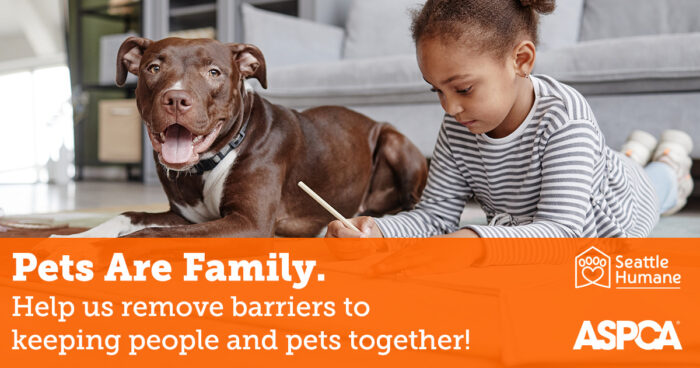
Finding affordable housing is a challenge. Finding affordable pet-inclusive housing is an even greater challenge. Seventy-two percent of US residents report difficulty in finding pet-friendly housing. Seattle Humane is committed to addressing this issue and fulfilling our mission to keep pets and their people together.
For the past three years, housing was one of the top reasons listed by owners surrendering pets to Seattle Humane, accounting for about 15% of total surrenders. It’s not just owners having to surrender their pets due to housing insecurities, but also difficulty managing pet deposits and pet rent. Seattle Humane is more than just an adoption center – we are a pet resource center, providing a lifeline to help families stay together.
“The need is great and never-ending. People are forced to make heartbreaking decisions of paying unexpected and additional expenses like pet rent and deposits or losing a beloved family member,” said Seattle Humane Pet Resource Center Director Julie McCabe. “We do our best to provide assistance and are dedicated to keeping families together.”
Washington state ranks among the most “pet-friendly” states for housing. It’s true, we love our pets. But what does “pet-friendly” mean?
Many “pet-friendly” properties come with a laundry list of restrictions. Yes, they may allow pets but only if they meet certain criteria. To add insult to injury, some of these restrictions are vague or not well documented, leaving prospective renters at the mercy of property owners.
This is why Seattle Humane is partnering with the ASPCA to remove barriers to affordable and pet-inclusive housing through legislative action and an educational campaign for tenants and property owners. Our goal is to raise awareness about this important issue and to impact lasting and positive change. The ASPCA is actively engaged across the country on this issue, and we wanted to join forces to amplify the message in our community and ensure that no family has to choose between housing and their pets.
Pet Deposits and Rent
Housing instability has become a top issue in our region and often leads to pets being unnecessarily surrendered to shelters. In particular, we know this issue affects lower income renters at a disproportionate rate due to unregulated pet deposits and pet rent.
Luckily, Seattle Humane has programs so people don’t have to choose between their pets and housing. Mother of three Savi recently turned to us to help her keep her family together after her husband passed away. She wanted to provide a better living situation for her kids and needed assistance with her pet deposit.
“When my kids’ father passed away, I finally gave in to getting a dog, even knowing it would be tough financially. It was the first time I had seen them smile. I didn’t realize how living in our old apartment would have impacted the kids so much and decided to move,” Savi shared. “I didn’t realize how much the dog deposit would be. Seattle Humane stepped in and saved our dogs. When I thought I lost hope, they gave me a blessing. I now have two more family members.”
In the city of Seattle, there are rules for how much one can be charged for a refundable pet deposit – no more than 25% percent of the monthly rent, and that’s for ALL pets in the household. However, outside of Seattle there is currently no cap on how much property owners can charge. Pet rent is typically an additional cost per animal in the household.
Addressing this pet deposit free-for-all is at the top of our agenda, and we are working with local legislators to institute a cap on pet deposits, and ensure they are reimbursable just like other damage and security deposits.
Breed and Size Restrictions
Another common line item on “pet-friendly” leases is a restriction on specific breeds and weight limits. According to Seattle Humane’s Behavior Program Director Emily Keegans, there is a lot of overreporting of incidents caused by “confirmation bias,” meaning you look for things that support your argument. As a result, incidents involving breeds like pit bulls, rottweilers or German shepherds may get reported more often. A dog may look like a certain breed but there’s no guarantee that’s what they are. It is extremely difficult to correctly identify a dog’s genetic makeup just by looking at them. And furthermore, as Emily shared, “you can’t predict behavior solely based on a dog’s breed—socialization and training play a huge role.”
The belief that larger dogs shouldn’t live in apartments is also a misnomer.
“If you are looking to gauge how destructive a dog is going to be in your home or how well they’ll adjust to living in an apartment, weight should have nothing to do with it,” Emily says. “Many large-breed dogs are actually quite mellow and lazy—happy with a walk a day, and then ready to chill on the couch with you for the rest of the time, compared to some high-energy smaller dogs whose need for exercise and mental stimulation is significantly higher.”
She also believes that dogs are sometimes better off in apartments because the owner has to take them out two or three times a day. Compare this to someone with a yard who opens the back door and expects them to entertain themselves. Dogs rarely entertain themselves and need stimulation and interaction whether it’s a walk and a sniff or a rigorous game of fetch in your backyard.
Like people, dogs should be regarded as individuals. While breed and size can be indicators, socialization and training can play a larger role in dog’s personality and behavior.
What can you do?
First all, know your rights! Read up on laws that impact your ability to have a pet in your rental housing in your area. Make sure it’s the official government site. There’s a lot of misinformation online.
If your pet-friendly lease has restrictions or vague language like “dangerous breeds,” have the property manager explain in writing what this means. We also recommend having them meet your pet and showing them your dog’s “resume.” Is your dog crate trained? Taken training classes? Can you get references from previous property owners? All this evidence can make the case that your pup or cat is a good tenant. At Seattle Humane, we offer training courses that include the AKC Canine Good Citizen course.
How You Can Help
You are invited to join Seattle Humane and the ASPCA at the Rocky Pond Winery’s tasting room in Woodinville on Saturday, December 16 from 12 – 2 p.m.
You’ll have the chance to meet Representative Amy Walen as well as experts from Seattle Humane and the ASCPA to better understand the housing challenges in our area that are leading to unnecessary pet surrenders to shelters, and we invite you to be part of the solution! This is a family friendly event; pups welcome out on the covered/heated patio. RSVP today and we look forward to seeing you in Woodinville on December 16.
If you agree with what Seattle Humane, the ASPCA and other organizations across the state are proposing, please sign the petition.
If you or someone you know is experiencing housing insecurity, please visit our website to learn about the programs we offer to support pet owners and read more about our advocacy efforts and learn what you can do to help.


After reading all of this the only thing I’d like to add is that I’ve seen issues with rentals where they change the pet policy during the time you are leasing sometimes forcing you to move because your pet no longer fits into their pet policy.